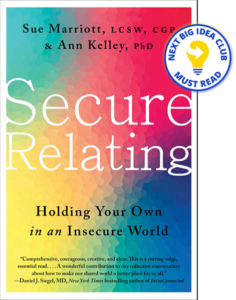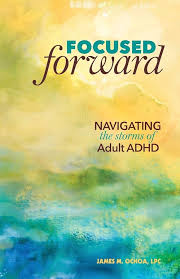Attention Deficit Hyperactivity Disorder (ADHD) in adults
James Ochoa and co-host Sue Marriott explore the different subtypes of ADHD, and the impact on adults who are navigating a diagnosis later in life. As an ADHD expert, Ochoa shares insights on the emotional and mental stress that accompanies ADHD, as well as provides different techniques for managing symptoms. With an emphasis on the importance of self-care, communication, and personalized strategies, he provides resources and training for adults with ADHD, professionals who work with ADHD clients, and family members of individuals with ADHD.
“…It feels like their attachment to themselves has always seemed off, and when they receive an accurate diagnosis then suddenly there’s these lights that turn on…” – James Ochoa
Time Stamps for New Frontiers of Adult ADHD
02:05 Stumbling Upon an Adult ADHD Diagnosis
04:40 Understanding the Subtypes of ADHD
08:06 Resourcing and Self-Care for ADHD
10:04 Managing ADHD Symptoms: Breathing Exercises and Micro-Meditations
15:32 Interrupting Over-activation and Panic in ADHD
26:55 Managing ADHD: Strategies and Self-Care
31:17 Supporting Loved Ones with ADHD
35:37 Educating Professionals on ADHD
43:49 Resources and Training for ADHD
About our Guest – James Ochoa
 For over thirty years, James Ochoa, LPC, has combined counseling, coaching, mentoring, and intuition to help adults with ADHD overcome challenges, pursue passions, and live meaningful lives. Most of his clients seek help beyond ADHD organization and time-management strategies. As valuable as those skills can be, James’ key concepts involve working with his clients’ imagination, life history and inner resources. His insight-and-action-based counseling style has helped clients from all walks of life, including executives, indie film producers, college students, religious leaders and beyond. He welcomes individuals, couples, and family members, whether from Austin, Texas, or points beyond. James is also working on his second book, When the Shiny Wears Off, Navigating the Lifetime Storms of Adult ADHD, which focuses on how to handle the chronic stress of ADHD that never completely stops wreaking havoc. The book will offer ample strategies to help mitigate the impact this disruption has on relationships, career, self-care, and mental health.
For over thirty years, James Ochoa, LPC, has combined counseling, coaching, mentoring, and intuition to help adults with ADHD overcome challenges, pursue passions, and live meaningful lives. Most of his clients seek help beyond ADHD organization and time-management strategies. As valuable as those skills can be, James’ key concepts involve working with his clients’ imagination, life history and inner resources. His insight-and-action-based counseling style has helped clients from all walks of life, including executives, indie film producers, college students, religious leaders and beyond. He welcomes individuals, couples, and family members, whether from Austin, Texas, or points beyond. James is also working on his second book, When the Shiny Wears Off, Navigating the Lifetime Storms of Adult ADHD, which focuses on how to handle the chronic stress of ADHD that never completely stops wreaking havoc. The book will offer ample strategies to help mitigate the impact this disruption has on relationships, career, self-care, and mental health.
Resources for New Frontiers of Adult ADHD
Living Well With ADHD – 10/19 live, in-person training in Austin, TX – This is a great resource for ADHD awareness month that is happening the entire month of October! (Use code TU30OFF for 30% off)
Focused Forward – James Ochoa’s Book – Get your copy here!!
And of course, our book is also a great resource – it’s for professionals and life-long learners of all kinds. If you’ve read it we’d love to hear from you and if you support it, PLEASE leave a review on either Amazon or Goodreads. Tk you!!

Events, Announcements & Resource Links

Mind, Body, Social, & Spiritual Approaches for Healing Attachment: 30 World-Leading Pioneers Share Their Best Practices – Register now for the Holistic Attachment Summit!! – This summit will explore the most essential ideas in attachment theory, research, and how they can be applied to create deep and lasting healing for clients — enabling you to be at the forefront of evidence-based care. Click here to register!!
Trauma Therapy Directory – Resources for Trauma, PTSD, and Complex PTSD – Created by our friends at the Trauma Therapy Network!
Support this library of content at TU staying FREE and TOTALLY ACCESSIBLE by supporting our partners and the sponsors of today’s episode –

Go to ZocDoc.com/TU
Compare high quality, in-network doctors, choose the right one for your needs, and click to instantly book an appointment.

Become the best version of yourself and get 15% off Ned products with code TU.
Thanks for listening, friends, & for being on this journey with us!

 Therapist Uncensored Podcast
Therapist Uncensored Podcast 
 For over thirty years, James Ochoa, LPC, has combined counseling, coaching, mentoring, and intuition to help adults with ADHD overcome challenges, pursue passions, and live meaningful lives. Most of his clients seek help beyond ADHD organization and time-management strategies. As valuable as those skills can be, James’ key concepts involve working with his clients’ imagination, life history and inner resources. His insight-and-action-based counseling style has helped clients from all walks of life, including executives, indie film producers, college students, religious leaders and beyond. He welcomes individuals, couples, and family members, whether from Austin, Texas, or points beyond. James is also working on his second book, When the Shiny Wears Off, Navigating the Lifetime Storms of Adult ADHD, which focuses on how to handle the chronic stress of ADHD that never completely stops wreaking havoc. The book will offer ample strategies to help mitigate the impact this disruption has on relationships, career, self-care, and mental health.
For over thirty years, James Ochoa, LPC, has combined counseling, coaching, mentoring, and intuition to help adults with ADHD overcome challenges, pursue passions, and live meaningful lives. Most of his clients seek help beyond ADHD organization and time-management strategies. As valuable as those skills can be, James’ key concepts involve working with his clients’ imagination, life history and inner resources. His insight-and-action-based counseling style has helped clients from all walks of life, including executives, indie film producers, college students, religious leaders and beyond. He welcomes individuals, couples, and family members, whether from Austin, Texas, or points beyond. James is also working on his second book, When the Shiny Wears Off, Navigating the Lifetime Storms of Adult ADHD, which focuses on how to handle the chronic stress of ADHD that never completely stops wreaking havoc. The book will offer ample strategies to help mitigate the impact this disruption has on relationships, career, self-care, and mental health.



